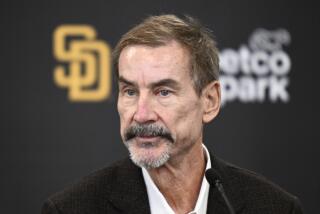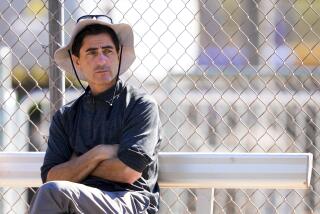Hats Off to Templeton : Padre Shortstop Proved Whitey Herzog Wrong and, With One Positive Gesture, Emerged as Team Leader
- Share via
YUMA, Ariz. — It was a spontaneous act, a way to answer the critics and the doubters who had been sniping at him for years.
When Garry Templeton stepped out of the dugout in the cool October twilight, he heard a voice.
There was the tumultuous roar of nearly 60,000 voices blending into one deafening wall of sound.
But there was also another voice, one from within. That was the voice to which he listened.
“I felt something deep inside me, yes I did,” Templeton said with a touch of evangelical fervor. “I felt I had to do something. Normally, I stay on the quiet side, but I knew I had to go with my natural instincts. I sure didn’t want to lose three straight games in the playoffs.”
The Padres had lost the first two games of the National League playoffs to the Chicago Cubs at Wrigley Field. Now they were back home for Game 3. The crowd had worked itself into a frenzy.
Then Templeton came out of the dugout, jumping and dancing and waving his cap, exhorting the fans to a decibel level never reached before at San Diego Jack Murphy Stadium.
The Dallas Cowboy cheerleaders could not have done a more effective job. What Templeton gave away in sex appeal, he made up in raw emotion.
It was easily the most dramatic moment of his baseball career, and it went a long way toward erasing the painful memory of the afternoon in St. Louis when an angry, depressed shortstop made an obscene gesture toward the fans in general and the world at large.
Steve Garvey watched Templeton’s unexpected display last fall, and filed it away under the heading of leadership.
“Leadership comes with experience and success and getting the right stimulation,” Garvey said. “It all came together for Garry, and he really asserted himself.
“Very few players really want to be a leader. It’s a singular decision for each man. I think Garry always had the capability, but it didn’t become public until the playoffs. I also think it will carry over, because he has the confidence now. That sort of thing doesn’t happen overnight. It must be nurtured.”
Templeton has no ambition to become an everyday cheerleader. For one thing, it would not be natural, and he does not have to step out of character anymore. He has proven that he cannot be stricken from the record book, that Whitey Herzog was wrong when he said that no team could win a pennant with Templeton at shortstop.
“That’s very gratifying to me personally,” Templeton said. “I think the public knows what type of player I am now. The thing Whitey said was so misleading. If a man doesn’t like you, he sure will say some bad things. But now the people have seen that I play hard and do my job.”
Catcher Terry Kennedy was Templeton’s teammate at St. Louis the year before Templeton’s gesture to the howling fans, an incident that led to Templeton’s being hospitalized for depression in 1981, and later being traded to the Padres.
“He’s really changed in the last five years,” Kennedy said. “He’s a lot more relaxed now. There was always so much tension with the manager and the front office.
“What he did in the playoffs really helped to get us fired up. I would also say it surprised me. But, you know, there’s always been this off-the-wall quality to Tempy.”
Padre Manager Dick Williams compared Templeton to Sal Bando, one of the leaders of his world championship teams at Oakland.
“The cheerleading may have looked out of character, but it sure came out at the right time,” Williams said. “Tempy has always been sort of reserved around you guys (sportswriters), but he’s never been afraid to speak up around his peers.
“He’s been a leader ever since I’ve been with this team. All my plays go through him. He controls my defense. I can appreciate what he has done. He had bad knees for a long time, but he got sound last July and started playing like they (the fans) expected.”
Templeton has always had problems with the expectations of others. The root of the problem is stylistic.
Templeton simply makes playing baseball look easy. That seems to irritate a lot of people, who expect million-dollar athletes to strain and sweat and get their uniforms dirty.
Templeton is the antithesis of that. He hardly ever appears to be trying, and he handles a bat as casually as a kid wielding a whiffle-ball bat. He flows to ground balls with a relaxed motion that belies the years of work he has put into the game.
“I’ve always had the damnedest time with people who misunderstand my style,” Templeton said. “I played the way I have done since I was little. As long as I get the job done, what difference does it make?
“From the time I was in junior high (in Orange County) I worked on getting to the ball and getting rid of it with the least amount of strain. That’s why it looks easy now. It may seem simple, but I’m really giving it all I have. There’s a secret to how I do it, but I’m not giving it away.”
Well, someday. When he gets older, maybe Templeton will tell.
“It’s all in how you get to the ball,” he said, parting with just a bit of the secret. “If your body is in the right position, if you catch the ball with your legs right, you can throw without a lot of effort.
“I’m real aware when I go into the hole to backhand a ball. I can get to it and throw real easy because of all the work I’ve done to make that play.”
San Diego utilityman Tim Flannery said he believes Templeton is the best shortstop in the National League. And backup third baseman Jerry Royster, obtained from the Atlanta Braves last winter, has gained extra appreciation for Templeton since joining the Padres.
“I always knew he was good,” Royster said. “I was aware he had special qualities. Of course, I had also heard he had a bad attitude. I really hate to hear that and I don’t believe it. He hasn’t shown it around me.
“Tempy has been very helpful to me this spring. I’ve been playing this game a long time, but he has really helped me out, getting to know our pitchers and how to position myself.”
There was a time when Templeton was regarded as potentially the best-hitting shortstop in baseball. That was in the late 1970s, before he developed knee problems and before Robin Yount, Alan Trammell and Cal Ripken Jr. surpassed him offensively.
Templeton hit .322, .319 and .314 in his best years with the Cardinals, when he was able to get 25 or 30 leg hits a year. He no longer has that capability, even though most of the pain is gone from his knees now.
At 29, after three straight years of hitting about .250, he must content himself with being the eighth hitter in the Padre lineup.
“It would be difficult to hit .300 again because I just don’t see enough good pitches, batting eighth,” he said.
“If I did manage to hit .300, that would really be an accomplishment. It just doesn’t happen when you’re that low in the batting order.”
Kennedy agreed.
“It would kill any hitter to bat that low,” he said. “The pitcher isn’t going to want Tempy to hurt him, especially in a situation with a base open and a runner in scoring position. He just won’t get anything to hit. But still, he’s probably the best eighth-place hitter in the league.”
Batting coach Deacon Jones wants to make sure of it. He has challenged Templeton to become a more disciplined hitter.
“Garry knows if he gets himself out by swinging at bad balls, he’s going to hear from me,” Jones said. “He is going to have to be more cognizant of his strike zone if he wants to become an aggressive hitter who still has some control.”
Templeton finds it frustrating because he believes he is just as good a hitter as he ever was. Stubbornly, he went several years without trying to adjust when pitchers stopped giving him a lot of fastballs. He started changing last summer, after becoming reconciled to a diet of junk pitches.
“I have to accept what is,” Templeton said. “I know I won’t be seeing the hard stuff. But I would still like to hit .280 and drive in some big runs. What matters to me now is helping us win.
“There used to be talk about me being the best shortstop in baseball. I never listened to that stuff. There’s too many good players to make comparisons. Winning is good enough for me.”
Winning, he has found, is also the best way to muzzle critics.
More to Read
Go beyond the scoreboard
Get the latest on L.A.'s teams in the daily Sports Report newsletter.
You may occasionally receive promotional content from the Los Angeles Times.










